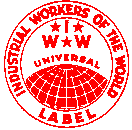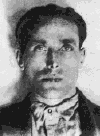


The following is reprinted from a St. Louis Post-Dispatch Editorial Commentary printed Friday, January 2, 1998.



The final remains of Joe Hill, the legendary martyr of the Industrial Workers of the World who was executed in Utah in 1915 on a trumped-up murder charge, were laid to rest in St. Louis. More precisely, a minute portion of Hill's remains were dispatched to the Gateway City, just as numerour other minute portions were sent to locations around the country and even the world.
Founded in 1905, the Industrial Workers of the World willingly embraced the task of organizing unskilled workers, regardless of race, nationality or gender, who were generally ignored by the craft union-oriented American Federation of Labor. In the West, the IWW - known as Wobblies - reached out to laboreres in the timber industry and to migratory agricultural workers. In the East, Wobblies sought to organize the brutally exploited workers in the steel and textiles mills.
Born in Sweden in 1879, Joel Hagglund came to the United States in 1902. He "Americanized" his name to Joseph Hillstrom and then simply to Joe Hill. He worked as an itinerant laborer and joined the IWW in 1910.
Although Hill was vitally involved in several strikes and free speech fights, he achieved fame as the song-writer of the Wobblies. His clever, rousing ditties made his name known in radical circles from coast to coast. Usually set to the melodies of popular tunes, Hill's songs included such classics as "Casey Jones - the Union Scab," "Scissor Bill" and "Mr. Block."
Hill's acknowledged masterpiece was "The Preacher and the Slave." Sung to the tune of "In the Sweet Bye and Bye," it cuttingly satirized "long-haired preachers" who console hungry workers with the promise "You'll get pie in the sky when you die." This phrase, coined by Hill, passed into the American vernacular.
Hill journeyed to Utah in 1913 to assist IWW Local 69 in its struggle against the rabidly anti-union Utah Construction Co., Utah Copper Co. and Salt Lake City police force that were all equally determined to destroy that state's IWW. Little did Hill realize that his days as the troubadour of the labor movement were soon to end.
On Jan. 10, 1914, at about 9:45 p.m., two armed masked men entered the Salt Lake City grocery store of John Morrison and his sons, 17-year-old Arling and 14-year-old Merlin. Shouting "We've got you now," one of the intruders opened fire on Morrison and wounded him.
Merlin took cover behind some shelves, but Arling grabbed a revolver and returned fire, wounding one of the masked men. According to Merlin, the intruders "wheeled and fired at my brother three times." Arling was killed instantly. John Morrison died later that night.
Around 11:30 p.m. on the night the Morrisons were killed, Joe Hill appeared at a doctor's office about six miles from Morrisons' grocery store to seek treatment for a gunshot wound to his left side. Three days later, the physician reported Hill's wound to the Salt Lake City police. The Wobbly troubadour was swiftly arrested and, after a preliminary hearing, bound over to stand trial for the murder of John Morrison.
Generations of scholars, labor leaders and radical activists have pointed out that Hill's conviction was based on circumstantial evidence. Not one state's witness, even Merlin Morrison, was able to identify Hill as Morrison's murderer.
Morrison, a former Salt Lake City police officer, had numerous enemies who might have wanted him dead. Just a few days before his murder, he admitted to a police captain that he lived in constant dread of the men he had arrested.
Mrs Morrison told police her husband had mentioned two neighborhood men whom he regarded as enemies, saying "If anything ever happens to me, you may have to look them up." Still, it was Joe Hill, who possessed no possible motive for the crime, that a Utah jury convicted of Morrison's murder.
Hill claimed he had recieved the incriminating gunshot wound in a quarrel with another man concerning a married woman and refused to name either party since he wished to protect the woman's reputation. This alleged gallantry lent much to Hill's mystique but seriously hampered his defense.
Mass protests across the country and the world as well as personal pleas by the Swedish ambassador and President Woodrow Wilson were to no avail. After languishing in jail during the appeals process, the Wobbly troubadour was finally scheduled to die on Nov. 19, 1915.
Hill had put his long incarceration to good use by writing letters, poems and even new songs such as "The Reberl Girl," inspired by his friendship with fellow Wobbly Elizabether Gurly Flynn. His final work was his last will, written in verse, which contained the lines, "And let the merry breezes blow/My dust to where some flowers grow."
On the eve of his execution, Hill sent two telegrams to IWW General Secretary-Treasurer "Big Bill" Haywood. The first message bade Haywood farwell and briskly concluded, "Don't waste any time in mourning. Organize."
The second telegram proved that not even impending death could break Hill's spirit and sense of humor. He facetiously asked Haywood if his corpse could be taken to the Wyoming state line because "I don't want to be found dead in Utah."
Also on execution eve, WIlliam Busky announced that he had been with his friend Hill continuously from 1 p.m. to 10 p.m. on the day of Morrison's murder and that Hill had no gunshot wound when they parted company. An affidavit stating this was telegraphed to Utah Gov. William Spry, but he let the execution proceed.
It was later learned that Busky had related his story to the Salt Lake City police shortly after Hill's arrest but had been forced to leave Utah with the warning to remain out of the state.
Given a choice between hanging or firing squad, Hill selected the latter. Some sources even have him yelling the order to fire in a final act of defiance while tied to a chair with a paper target over his heart.
Hill's body was taken to a Salt Lake City funeral home for an initial viewing and then to Chicago for a massive memorial service at the West Side Auditorium. After a funeral procession that wound through choked streets, Joe Hill was cremated.
On Nov. 19, 1916, the first anniversary of Hill's execution, tiny packets of his ashes were presented to delegates at the IWW Tenth Convention. Hill's ashes were eventually distributed to Wobblies from all 48 states - except Utah - and every South American nation in addition to Australia, New Zealand, South Africa and several European and Asian countries.
According to an unpublished memoir by the late Rober Saunders, a St. Louis labor leader who served as secretary of this city's Wobbly local in those days, a packet of Hill's ashes "was sent to the secretary of each of the Wobbly locals."
The typewritten memoir, in the Western Historical Manuscript Collection at the University of Missouri at St. Louis, notes that "In St. Louis, we held a short memorial service in one of the meeting rooms of the Public Library. After the meeting I scattered the ashes on one of the flower beds on the Fourteenth Street side."
According to Saunder's account, the St. Louis Wobblies eventually met with disaster from the federal government's nationwide persecution of the IWW during World War I. "In the autumn of 1917, the Wobbly Hall, on south Seventh Street, near Walnut, was raided. All of the members, and others who were present, were arrested. The judge gave those of military age the option of a year in the workhouse or an enlistment in the army."
Fourtunately for Saunders, he was not present at the time of the raid. He noted, "The St. Louis local never recovered."
But Joe Hill's ashes had been scattered in the Gateway City "where some flowers grow," just as he had requested. More importantly, the labor movement had been bequethed a proud legacy of courage and defiance as well as a stern injunction, still taken to heart by activists the world over: "Don't waste any time in mourning. Organize."
John J. Dunphy, Godfrey, is the founder of the Metro East Writers' Workshop and a two-time winnter of The Humanist magazine's North American Essay Contest.

Unlike this article though, the St. Louis local is still alive and growing. Come down to our meetings (directions on Home.html page), or write us at:
St. Louis IWW GMB
POBox 63211
St. Louis, MO
63163
and solidarity forever!
************************************************************
There were also follow-up letters in the Post concerning the Joe Hill article.
First was a letter by a lady named Evelyn Schultz (Jan. 12 ed.)
and then a follow-up to Evelyn's letter by local Secretary/Treasurer Tim Dunn
************************************************************